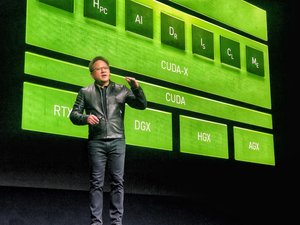
Artificial intelligence is everywhere at this year’s Consumer Electronics Show this week, finding its way into the semiconductor industry, personal computers, automobiles and video games.
Silicon Valley companies were not immune from the trend either, some dominating the conversation and making headlines when the conference kicked off Monday.
Now in its 58th year, the 2024 installment of CES has over 4,000 companies exhibiting along with 1,200 startups displaying their newest products or services from the show's traditional home in Las Vegas. Many exhibitors and featured speakers — representing, among others Nvidia Corp., Microsoft Corp and Amazon.com Inc. — hoped to address some of the concerns surrounding artificial intelligence while still highlighting their companies' AI-driven advancements.
The Consumer Technology Association, which hosts the annual tech conference, said it expects to see over 130,000 in-person attendees over the week, up from 115,000 last year and 45,000 attendees in 2022. The show went all virtual in 2021 because of the Covid pandemic.
Here are four Silicon Valley companies that made significant AI-related announcements this week at CES:
Intel Corp.
The Santa Clara-based chipmaker is at CES to bring life to CEO Pat Gelsinger's "AI everywhere" focus. And Intel unveiled what it described as “the first-generation AI-enhanced software-defined vehicle system-on-chip.”
Intel aims to compete with other semiconductor companies Nvidia and Qualcomm, which already have chips focused on the autonomous vehicle market. Where Intel will try to differentiate itself is that it intends to create chips that automakers can use in vehicles of all types, rather than segmenting them based on whether a car is for the economy or luxury segments.
Intel hopes to have its auto chips out by the end of this year that would be used in a future line of automobiles that are defined by the software they offer, according to Jack Weast, vice president and general manager of Intel Automotive.
Nvidia
Artificial intelligence powerhouse Nvidia Corp. unveiled three new AI graphic chips meant for personal computers.
At the start of CES on Monday, the Santa Clara-based tech titan said its RTX chip line is primarily meant for gamers and designers so they can have more autonomy with AI programs rather than relying on third-party sites or companies.
Set to hit the market by the end of January, the GeForce RTX 4080 SUPER promises to allow users to access faster processing speeds, run prior software accessible through different generations of Nvidia’s technology and power games that use 4K resolution ray tracing — the process of building an image using carefully calculated rays of light.
Once available, the RTX 480 will cost $999, the company said. Separately, Nvidia also unveiled two chips — the RTX 4070 Ti SUPER and RTX 4070 SUPER — to enhance gaming and AI capabilities in PCs. Those chips will cost, respectively, $799 and $599.
In a news release, Nvidia said the latest chips will offer users an augmented gaming experience, featuring more lifelike capabilities achieved through AI-enhanced high-definition imagery. The hardware will also provide users with access to better image-editing software, the company claims.
Advanced Micro Devices
Advanced Micro Devices Inc. announced a new AI processor for desktops.
The processor, Ryzen 8000G, is expected to provide users, primarily gamers, a cost effective way to build gaming systems. At $329 a pop, the Ryzen 8000G will provide users with smoother gameplay on lower graphics settings, enable trouble-free media editing software capabilities and help save battery life. The processor is a less powerful alternative to the company's Ryzen 7700X, which offers similar capabilities but at a higher resolution.
According to the company, the processor can outperform Intel Corp.'s latest processor.
Separately, the Santa Clara semiconductor teased a new chip for mobile devices.
Kodiak Robotics
Kodiak Robotics Inc. unveiled an autonomous, driverless semi-truck. The Mountain View-based startup said the vehicle is ready for “scaled deployment” and will be equipped with additional mechanical components to allow for safe operation at scale. This is the company’s sixth-generation truck.
The truck will be equipped with 12 cameras, four lidar sensors and six radar sensors, which will rely on Nvidia graphics processing units to process data collected. The company, which was founded in 2018, said in a news release that later in the year it plans to integrate next-generation AI control systems to better improve the truck’s sensors.
For now, the truck will run various driverless operations between Dallas and Houston, Texas, according to the company.
To date, Kodiak Robotics has raised over $198 million in funding from backers such as CRV, Lightspeed Venture Partners, TriplePoint Capital, among others, according to PitchBook Data.







